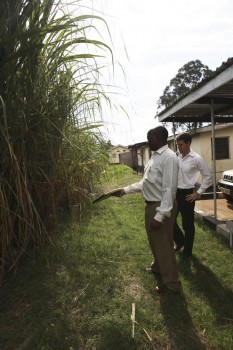Dean Karlan's Wall Street Journal Op-Ed: What We Can Learn From Congress and African Farmers About Losing Weight this New Year
I have an op-ed in the Wall Street Journal (link may require subscription), where I call for some respect for the U.S. Congress’ Fiscal Cliff idea. Congress, back in 2011, couldn’t agree on a budget, so came up with a way to force the hand of its future self. This idea of forcing one’s own future behavior dates back in our culture at least to Odysseus, who had his crew tie him to the ship’s mast so he wouldn’t be tempted by the sirens, and Cortés who burned his ships to show his army that there would be no going back.
Economists call this method of pushing your future self into some behavior a “commitment device.” As I say in the piece:
Most of us don't have crews and soldiers at our disposal, but many people still find ways to influence their future selves. Some compulsive shoppers will freeze their credit cards in blocks of ice to make sure they can't get at them too readily when tempted. Some who are particularly prone to the siren song of their pillows in the morning place their alarm clock far from their bed, on the other side of the room, forcing their future self out of bed to shut it off. When MIT graduate student Guri Nanda developed an alarm clock, Clocky, that rolls off a night stand and hides when it goes off, the market beat a path to her door.

My colleagues and I at Innovations for Poverty Action look for ways to help the poor around the world improve their financial conditions, and have been exploring the science of commitment devices.
In the Philippines, we partnered with a bank to offer a commitment savings account – a savings account customers could make deposits into but not withdrawals until a stated time or savings goal was reached – and found they helped customers save 81% more than a control group. Even better, when we offered accounts to smokers, tweaking it so getting their money back required passing a urine test for nicotine, those who used it were roughly 50% more likely to have successfully stopped smoking 6 months and a year later.
IPA researchers have also looked into using commitment devices for African farmers who generally have money after the harvest season, but not still a few months later during the planting season, when investments in better seeds and fertilizer would improve their crop yield.
- In Kenya, researchers tried allowing farmers to commit to buying fertilizer in advance. Farmers paid for it when they had the cash handy during the harvest season, but it was delivered during the next planting season. Changing to the advance commitment model was as effective for encouraging fertilizer use as a 50% subsidy in fertilizer prices.
- In Malawi, allowing farmers to direct some of their harvest profits into commitment savings accounts, which held the money until the following planting season, increased investment back into crops and boosted the value of the resulting harvest significantly.
I think Congress deserves some credit - think about the way an individual lawmaker’s incentives are aligned. It’s easy for an individual politician to get nailed for voting for something unpopular, but hard to assign credit/blame for diffuse long term macroeconomic phenomena like unemployment. Granted Congress hasn’t solved the budget problem, but taking the step of setting up their own commitment device to force themselves into at least some action is noteworthy.
People in the U.S. have used websites where they commit money to a cause if they fail to achieve their exercise or other goals for years, in fact I co-founded such a site with fellow Freakonomics blogger Ian Ayres, but there are plenty of ways to come up with your own commitment devices. So when you’re looking at that treadmill, think of the Filipino smokers, the African farmers, or if you absolutely have to, Congress, and figure out what kind of commitment would motivate you to get up there.











